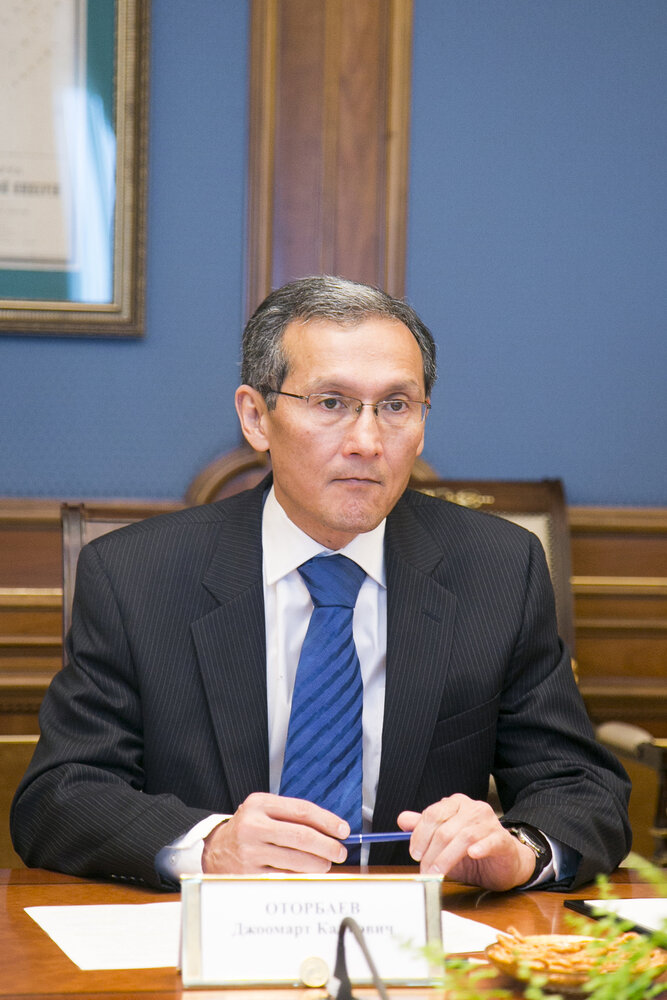TEHRAN - Writing an article in China Global Television Network (CGTN) on Friday, former Kyrgyz Prime Minister Djoomart Otorbaev expresses hope that Iran will join the Eurasian Economic Union (EAEU) as soon as possible.
“There is no reason not to believe the speaker of the Iranian Parliament. However, still, his latest statement on Iran's official request to become a full member of the Eurasian Economic Union (EAEU) sounded like ‘a bolt from the blue’,” Otorbaev said.
Qalibaf paid a three-day visit to Moscow in early February to hold talks with Russian State Duma Speaker Vyacheslav Volodin.
“Upon arrival in Tehran after a 3-day trip to Moscow, Mohammad Baqer Qalibaf said that preliminary works for Iran's full membership in the Eurasian Economic Union (EAEU) unites Armenia, Belarus, Kazakhstan, Kyrgyzstan, and Russia,” he noted.
“Many still do not believe that this statement will develop into a real process. Some experts even question whether this statement contains elements of political maneuvering. Despite existing doubts, it would be essential to analyze the possible consequences of such an unexpected step,” he remarked.
As a distinguished professor of the Belt and Road School of Beijing Normal University, Otorbaev explained, “Iran obtaining the status of a full member of the EAEU can fundamentally change the political landscape in Eurasia, especially in the South Caucasus and the Middle East (West Asia). As a member of the EAEU, Iran would cooperate with its members at the highest strategic partnership level. Membership in the organization will give the country serious trump cards in the implementation of its foreign policy.”
In his article, he highlighted the economic dimension of the EAEU and noted, “Iran believes it is the military-political component that can provide a severe security belt for the Islamic Republic. Expanding trade and economic opportunities are also of significant interest, especially amid a stagnant economy, intense U.S. pressure and gloomy predictions about the future of the nuclear deal that former U.S. President Donald Trump canceled.”
“Economic cooperation should also lead to closer political interaction. Taking such a step, Iran is finally emerging from strategic loneliness,” he stressed, saying, “By acquiring a new security umbrella, Tehran will be much more confident in negotiating with the U.S. on nuclear issues. Perhaps in the future, people will remember that the Americans themselves pushed Iran to join the post-Soviet ‘club’ in which Moscow is the leading player.”
As a member of Nizami Ganjavi International Center, Otorbaev said, “Despite all difficulties, the EAEU is getting on its feet and is enjoying increasing interest from many countries. By the end of last year, Moldova, Uzbekistan, and Cuba joined the union as observers.”
He added, “Vietnam, Iran, Singapore, and Serbia are already in an alliance under a free trade zone treaty. About 50 states have expressed their interest in cooperation with the bloc at different levels.”
Hoping the union's borders will reach the Persian Gulf, he added, “Iran, with its population of 83 million, is a strong economic power. In terms of nominal GDP, its economy is the twenty-second globally, the largest among Western Asia and the Organization of the Petroleum Exporting Countries (OPEC). Iran ranks fourth in the world and accounts for about 9.5 percent of the world's total oil reserves.”
Pointing to the advantages of the Union for the Caucasus and Central Asia region, he noted, “Armenia can acquire clear advantages. For this northern neighbor of Iran, removing customs barriers will be beneficial from receiving economic preferences and transit opportunities. As for Belarus, Kazakhstan, and Kyrgyzstan, these countries' economic relations with Iran remain limited. Therefore, it is evident that the main negotiations on finalizing the future union treaty's provisions will be conducted with Russia.”
Regarding the challenges the members of the union may face, he stressed, “When preparing the agreement, many problems will naturally arise, as was the case with the deal's preparation on a free trade zone between the EAEU and Iran. The process was long and tricky, but they managed to reach a consensus. With the parties' mutual desire and the presence of a political will, the contracting partners should smooth out all the rough edges. The prospects for cooperation will undoubtedly be more potent than the complexity of the negotiation process.”
“Some other sharp problems will arise, such as opening the labor market and creating employment opportunities for Iranians in the EAEU countries. Will the current members of the association be ready for such an unpredictable turn of events? Will migration from Iran complicate the problems with the current status quo among the countries? That one and a multitude of other issues need to be addressed,” he added.
Otorbaev emphasized Iran has become an ideal partner to develop new transport and energy corridors in the South Caucasus and wrote, “It became essential after the end of the Karabakh war between Armenia and Azerbaijan. Iran considers the forthcoming opening of transport and energy routes to establish a direct land connection with Russia through the Nakhichevan region of Azerbaijan, parts of Armenia, and Georgia. The Russian side is also interested in promoting this idea.”


No comments:
Post a Comment